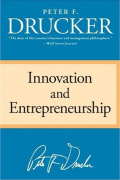My Account
Subscriptions
Summary Categories
Summary Collections
- Career & Life Satisfaction Collection
- Disruptive Innovation Collection
- Exceptional Leadership Collection
- Great Employees Only Collection
- Hidden Gems Collection
- Marketing Collection
- Must-Read Books for 2012 v1
- Must-Read Books for 2012 v2
- Must-Read Books for 2013
- Self-Help Collection
- Small Business Collection
- Strategic Assessment Collection
- Strategic Genius Collection
- Take Charge Collection
- Team Management Collection
- Ultimate Sales Collection
- Web Marketing Collection
Summary List
Innovation and Entrepreneurship
Peter F. Drucker
Summarized August 2011
Type: [SUMMARY]
SKU: 8111
ISBN: 0060851139
Price: $12.50
Available Formats:




Purchase Summary
Summary Description
Peter F. Drucker was, without a doubt, the foremost business thinker of the 20th century. As the author of more than three dozen books, he made an enormous impact on shaping the modern corporation.
During his lifetime, Drucker was a writer, teacher, philosopher, reporter, consultant to CEOs, and professor at the Peter F. Drucker and Masatoshi Ito Graduate School of Management at Claremont Graduate University.
Among the concepts that Drucker either invented or popularized are decentralization, treating workers as assets rather than expenses, the importance of putting the customer first, and the key role of the knowledge worker in the modern economy.
Jack Welch, former chairman of General Electric, called Drucker "The greatest management thinker of the last century," while Andy Grove of Intel said, "Simple statements from him have influenced untold numbers of daily actions; as they did mine over decades."
One of Drucker's most enduring works is Innovation and Entrepreneurship. Published in 1985, it was the first book to present innovation as a systematic discipline. It continues to influence today's top innovators and is frequently cited in the latest books and articles on innovation.
Our summary of this timeless classic focuses on what Drucker called the "seven sources of innovation." It also explains Drucker's principles of innovation: the five "do's" and the three "don'ts" that can mean the difference between a successful innovation and a failure.
 Member Log In
Member Log In